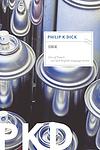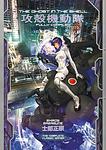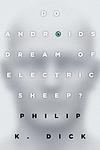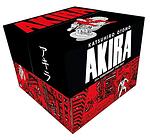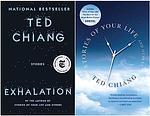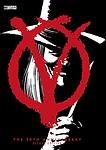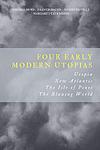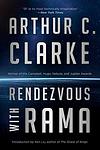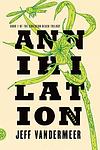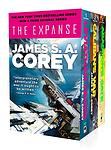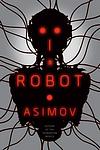The 50 Best Sci-Fi Books for Every Kind of Reader
This is one of the 284 lists we use to generate our main The Greatest Books list.
-
Ubik by Philip K. Dick
Set in a futuristic world, the novel follows Joe Chip, a technician at a psychic agency, who becomes trapped in a reality-altering phenomenon after a mission on the Moon goes wrong. As his reality begins to unravel, Chip and his colleagues find themselves in a bizarre world where time seems to be moving backward and a mysterious product called "Ubik" appears to be the only thing that can save them. The book explores themes of reality, entropy, and human perception in a surreal and often humorous manner.
-
Dune by Frank Herbert
Set in a distant future, the novel follows Paul Atreides, whose family assumes control of the desert planet Arrakis. As the only producer of a highly valuable resource, jurisdiction over Arrakis is contested among competing noble families. After Paul and his family are betrayed, the story explores themes of politics, religion, and man’s relationship to nature, as Paul leads a rebellion to restore his family's reign.
-
Labyrinths by Jorge Luis Borges
"Labyrinths" is a collection of short stories and essays that explore complex themes of infinity, parallel universes, and the blurred lines between reality and illusion. The narratives often feature protagonists who are scholars or librarians, trapped in surreal, metaphysical landscapes. The author's unique writing style combines elements of magical realism, philosophy, and detective fiction, creating an intricate web of narratives that challenge the reader's perception of reality and fiction.
-
Nineteen Eighty Four by George Orwell
Set in a dystopian future, the novel presents a society under the total control of a totalitarian regime, led by the omnipresent Big Brother. The protagonist, a low-ranking member of 'the Party', begins to question the regime and falls in love with a woman, an act of rebellion in a world where independent thought, dissent, and love are prohibited. The novel explores themes of surveillance, censorship, and the manipulation of truth.
-
Neuromancer by William Gibson
In this groundbreaking cyberpunk novel, a washed-up computer hacker is hired by a mysterious employer to pull off the ultimate hack. As he navigates a dystopian future filled with artificial intelligence, corporate espionage, and virtual reality, he must confront his own past and the dark realities of the digital world. The narrative explores themes of technology, identity, and consciousness, pushing the boundaries of science fiction literature.
-
The Ghost In The Shell by Shirow Masamune
This science fiction narrative delves into a future where cybernetic enhancements and artificial intelligence have blurred the lines between humanity and machines. Set against a backdrop of political intrigue and cyber warfare, the story follows Major Motoko Kusanagi, a cyborg operative of a government agency, as she hunts a mysterious hacker known as the Puppet Master. Through her pursuit, the narrative explores themes of identity, consciousness, and the nature of the soul, questioning what it truly means to be human in a world where the physical and digital realms are indistinguishably intertwined.
-
Do Androids Dream of Electric Sheep? by Philip K. Dick
Set in a post-apocalyptic world, the novel presents a future where Earth's life has been greatly damaged by a nuclear global war, leaving most species extinct. The remaining human population has been encouraged to emigrate to off-world colonies to preserve the human race. Those who remain on Earth are tasked with maintaining the ecological balance by owning and caring for animals, replacing extinct species with mechanical replicas when necessary. The story revolves around a bounty hunter, who is tasked with "retiring" rogue androids that pose a threat to humans, and his emotional and moral struggles as he goes about his work.
-
The Wind-Up Bird Chronicle by Haruki Murakami
A man's search for his wife's missing cat evolves into a surreal journey through Tokyo's underbelly, where he encounters a bizarre collection of characters with strange stories and peculiar obsessions. As he delves deeper, he finds himself entangled in a web of dreamlike scenarios, historical digressions, and metaphysical investigations. His reality becomes increasingly intertwined with the dream world as he grapples with themes of fate, identity, and the dark side of the human psyche.
-
Akira by Katsuhiro Otomo
Set in a post-apocalyptic Neo-Tokyo, this graphic novel follows the lives of two teenage friends, Tetsuo and Kaneda, who are members of a biker gang. After a motorcycle accident, Tetsuo develops telekinetic abilities and is taken by the military, which fears his growing powers might unleash another cataclysmic event similar to the one that destroyed Tokyo years earlier. As Tetsuo's powers spiral out of control, Kaneda, along with a group of rebels and psychics, must try to stop him and uncover the secrets of a mysterious entity known as "Akira," which is at the heart of the government's experiments and the city's destruction. The narrative explores themes of power, corruption, and the quest for identity against a backdrop of cyberpunk visuals and intense action.
-
Never Let Me Go by Kazuo Ishiguro
The novel is a haunting tale of three friends, who grow up together at a seemingly idyllic English boarding school. As they mature, they discover a dark secret about their school and the purpose of their existence, which is to become organ donors for the rest of society. The story is a profound exploration of what it means to be human, the morality of scientific innovation, and the heartbreaking reality of love and loss.
-
Stories of Your Life and Others by Ted Chiang
"Stories of Your Life and Others" is a collection of science fiction short stories that explore complex scientific and philosophical concepts. Each story delves into unique themes such as the nature of time, the basis of knowledge, and the human capacity for love. The most notable story in the collection involves a linguist who learns an alien language that reshapes her perception of time, which was later adapted into a major motion picture. The book is renowned for its intellectual depth, emotional resonance, and masterful storytelling.
-
Frankenstein by Mary Shelley
This classic novel tells the story of a young scientist who creates a grotesque but sentient creature in an unorthodox scientific experiment. The scientist, horrified by his creation, abandons it, leading the creature to seek revenge. The novel explores themes of ambition, responsibility, guilt, and the potential consequences of playing God.
-
The Metamorphosis by Franz Kafka
The book tells the story of a man who wakes up one morning to find himself transformed into a giant insect. His transformation causes him to lose his job and become ostracized from his family, who are horrified and repulsed by his new form. As he grapples with his new reality, he becomes increasingly isolated and starts to lose his sense of humanity. The book explores themes of alienation, guilt, and identity, and is a profound examination of the human condition.
-
The Three-Body Problem by Cixin Liu
The book is a science fiction novel that intertwines the cultural revolution of China with a complex narrative involving astrophysics, virtual reality, and alien contact. It follows a disillusioned scientist who, after suffering personal tragedy during the Cultural Revolution, sends a message into space, only to receive a response from an alien civilization on the brink of destruction. As the aliens plan their migration to Earth, a secret organization works to facilitate the invasion, while a disparate group of scientists and military personnel attempt to understand and prevent the impending extraterrestrial crisis. The novel grapples with themes of human nature, technological advancement, and the vast, often incomprehensible universe.
-
Solaris by Stanislaw Lem
The novel is a psychological exploration of human limitations and failures set against the backdrop of space exploration. When a psychologist arrives at a research station orbiting a distant planet covered entirely by a sentient ocean, he discovers the crew in disarray, haunted by physical manifestations of their subconscious fears and desires. As he grapples with the ocean's inscrutable nature and its unsettling ability to materialize human thoughts, he is forced to confront his own guilt and regret, embodied by the apparition of his deceased wife. The story is a philosophical meditation on the impossibility of truly understanding alien intelligence and the painful isolation of the human condition.
-
The Hitchhiker's Guide to the Galaxy by Douglas Adams
This comedic science fiction novel follows the intergalactic adventures of an unwitting human, Arthur Dent, who is rescued just before Earth's destruction by his friend Ford Prefect, a researcher for a galactic travel guide. Together, they hitch a ride on a stolen spaceship, encountering a range of bizarre characters, including a depressed robot and a two-headed ex-president of the galaxy. Through a series of satirical and absurd escapades, the book explores themes of existentialism, bureaucracy, and the absurdity of life, all while poking fun at the science fiction genre and offering witty commentary on the human condition.
-
The Martian by Andy Weir
A gripping tale of survival and resilience, this book follows the story of an astronaut left stranded on Mars by his crew who believed him dead after a fierce storm. With limited supplies, he must utilize his ingenuity, wit, and spirit to survive and signal to Earth that he is alive. The narrative is a thrilling testament to human willpower and the relentless fight for survival against all odds.
-
The Children of Men by P. D. James
Set in a dystopian future where mankind has become infertile, the novel centers on a history professor who becomes involved with a group of revolutionaries seeking to overthrow the oppressive government. As the world descends into chaos due to the impending extinction of the human race, a miraculous pregnancy offers a glimmer of hope. The professor must protect the pregnant woman and navigate the dangerous political landscape, while grappling with the implications of a world without children.
-
Slaughterhouse-Five by Kurt Vonnegut
The novel follows the life of Billy Pilgrim, a World War II veteran who has become "unstuck in time," experiencing his life events out of order. This includes his experiences as a prisoner of war in Dresden during the Allies' firebombing, his post-war life as a successful optometrist, his abduction by aliens from the planet Tralfamadore, and his eventual death. The book is a critique of war and a demonstration of the destructive nature of time, with a nonlinear narrative that reflects the chaos and unpredictability of life.
-
Brave New World by Aldous Huxley
Set in a dystopian future, the novel explores a society where human beings are genetically bred and pharmaceutically conditioned to serve in a ruling order. The society is divided into five castes, each with its specific roles. The narrative follows a savage who rejects the norms of this new world order and struggles to navigate the clash between the values of his upbringing and the reality of this technologically advanced, emotionless society. His resistance prompts a deep examination of the nature of freedom, individuality, and happiness.
-
V for Vendetta by Alan Moore
"V for Vendetta" is a dystopian graphic novel set in a future totalitarian England. The story follows a mysterious, anarchistic vigilante known only as "V" who wears a Guy Fawkes mask and seeks to overthrow the oppressive government. The novel explores themes of freedom, oppression, and the power of ideas, as well as the moral complexities of vengeance and violence. It also delves into the personal journey of a young woman named Evey, who becomes V's unlikely ally.
-
2001: A Space Odyssey by Arthur C. Clarke
This science fiction novel follows a voyage to Jupiter with the sentient computer HAL after the discovery of a mysterious black monolith affecting human evolution. Dealing with themes of existentialism, human evolution, technology, artificial intelligence and extraterrestrial life, it is a journey of discovery that takes a dangerous turn when the onboard computer begins to malfunction. The story is a complex mix of science, philosophy, and conjecture.
-
Fahrenheit 451 by Ray Bradbury
In a dystopian future where books are banned and burned by the government to prevent dissenting ideas, a fireman named Guy Montag, whose job is to burn books, begins to question the society he serves. After a series of events, including meeting a free-thinking teenager and witnessing a woman choosing to die with her books, Montag begins to secretly collect and read books, leading to his eventual rebellion against the oppressive regime. The narrative serves as a critique of censorship, conformity, and the dangers of an illiterate society.
-
The Blazing World A New World by Margaret Cavendish
"The Blazing World" is a pioneering work of science fiction and feminist literature that tells the story of a young woman who is kidnapped by a merchant and taken on a voyage to the North Pole, where she enters a parallel universe. In this other world, she becomes the empress of a society inhabited by a variety of hybrid creatures. The empress engages in philosophical discussions with the inhabitants and uses her power to lead a grand intellectual and military campaign back in her own world. The narrative explores themes of power, gender, and the role of science and knowledge, as the protagonist asserts her authority in a world that reflects the author's imaginative and intellectual ambitions.
-
Ringworld by Larry Niven
In this science fiction novel, a motley crew of explorers, including a 200-year-old human, a young woman with lucky genes, a cat-like alien, and a two-headed alien guide, embark on a journey to investigate an artificial ring orbiting a star. This colossal structure, known as the Ringworld, has the surface area of millions of Earths and harbors many mysteries. As the team explores the vast, enigmatic world, they encounter a variety of advanced technologies and alien species, while also grappling with the physics and dangers of the ring's environment. Their mission becomes a struggle for survival and a quest to uncover the origins and purpose of the Ringworld.
-
Rendezvous with Rama by Arthur C. Clarke
In this science fiction classic, humanity encounters an enigmatic alien starship that enters the solar system. Named after the Hindu god, the cylindrical vessel is initially thought to be an asteroid but is soon revealed to be a spacecraft. A team of astronauts is dispatched to intercept and explore the mysterious object, embarking on a high-stakes mission to unlock its secrets. As they journey through the ship's interior, they discover a world of astonishing complexity, artificial landscapes, and advanced technology, all of which challenge their understanding of life and intelligence in the universe. The explorers must race against time to learn as much as possible before the ship, indifferent to their presence, continues on its voyage through the cosmos.
-
The Left Hand Of Darkness by Ursula K. Le Guin
The novel is a groundbreaking work of science fiction that explores themes of gender, politics, and identity. Set on a planet called Gethen, where the inhabitants are ambisexual, shifting between male and female, the story follows an envoy from Earth who struggles to understand this alien society. As he navigates the complex political landscape of Gethen, he must also grapple with his own preconceptions about gender and sexuality. The book is a profound exploration of difference, otherness, and what it means to be human.
-
Jurassic Park by Michael Crichton
A billionaire entrepreneur, with the help of genetic scientists, creates a wildlife park on a secluded island filled with genetically engineered dinosaurs. When a small group of experts are invited to the park for a preview, things go awry as the security systems fail and the dinosaurs break free. The group must survive and escape the island while dealing with the dangerous prehistoric creatures and the moral implications of tampering with nature.
-
Flatland: A Romance of Many Dimensions by Edwin A. Abbott
This novel is a satirical critique of Victorian society told through a two-dimensional world known as Flatland, inhabited by geometric figures. The protagonist, a square, guides the reader through his society, explaining its rigid class structure, before being visited by a three-dimensional sphere. The sphere introduces him to the concept of the third dimension, challenging the Square's understanding of his own world. The story then explores themes of perception, dimensions, and the limitations of understanding and knowledge.
-
Foundation by Isaac Asimov
This science fiction novel centers around Hari Seldon, a mathematician who has developed a branch of mathematics known as psychohistory. With it, he can predict the future on a large scale. Seldon foresees the imminent fall of the Galactic Empire, which encompasses the entire Milky Way, and a dark age lasting 30,000 years before a second great empire arises. To shorten this period of barbarism, he creates two Foundations at opposite ends of the galaxy. The book follows the first few centuries of the Foundation's existence, focusing on the scientists as they develop new technologies and negotiate with neighboring planets.
-
Children Of Time by Adrian Tchaikovsky
"Children of Time" by Adrian Tchaikovsky is a science fiction novel that explores the evolution of two species, humans and spiders, on different planets. When Earth faces destruction, a group of humans embarks on a mission to terraform a new planet and create a new civilization. However, an experiment involving a virus meant to accelerate the evolution of monkeys goes wrong, leading to the unintended uplift of spiders. The story follows the parallel development of both species, highlighting their struggles, conflicts, and eventual convergence as they vie for dominance in a rapidly changing world.
-
Annihilation by Jeff VanderMeer
In the novel, a team of four women—an anthropologist, a surveyor, a psychologist, and a biologist—embark on an expedition into Area X, a mysterious and remote region cut off from civilization. The area is known for its strange occurrences and the disappearance of previous expedition members. As the team delves deeper into the wild and enigmatic landscape, they encounter bizarre creatures, cryptic signs, and the remnants of a lost civilization. The biologist, serving as the narrator, documents their discoveries and her own personal transformations, driven by the unseen forces of Area X. The novel explores themes of nature, mutation, and the unknown, as the expedition's members confront the limits of knowledge and the consequences of seeking to uncover the inexplicable.
-
Cloud Atlas by David Mitchell
This novel is a unique blend of six different stories, each set in a different time and place, spanning from the 19th century South Pacific to a post-apocalyptic future. Each tale is written in a different style, reflecting the time and setting it represents, and they are all connected through shared themes and recurring motifs. The stories are nested within each other, with each interrupted by the next, only to be concluded in the second half of the book. The novel explores themes of predacity, civilization, reincarnation and the eternal recurrence of the same behaviors throughout history.
-
Oryx and Crake by Margaret Atwood
Set in a post-apocalyptic world, the novel follows the life of Snowman, who believes he may be the last human on earth, as he struggles to survive in a new, harsh environment. He is surrounded by genetically modified creatures, and his only companions are the Crakers, human-like beings created by his brilliant but disturbed friend Crake. Through Snowman's memories, the story of how the world came to be this way is revealed, involving a love triangle with the mysterious Oryx and the catastrophic consequences of Crake's scientific experiments.
-
Leviathan Wakes by James S. A. Corey
In a future where humanity has colonized the solar system, tensions rise between Earth, Mars, and the Belt, a region of space where resources are mined. The story follows a weary detective and an idealistic ship's officer who become embroiled in a vast conspiracy after a distress signal from a missing young woman leads them to a derelict spaceship and a potentially lethal alien life form. As the political situation deteriorates, they must navigate through the intricacies of interplanetary intrigue, terrorism, and an impending war, all while trying to prevent the spread of an extraterrestrial virus that threatens all of human civilization.
-
Station Eleven by Emily St John Mandel
"Station Eleven" is a post-apocalyptic novel that revolves around the lives of several characters before and after a devastating flu pandemic wipes out most of the world's population. The narrative jumps back and forth in time, exploring the interconnectedness of the characters' lives through their shared memories and experiences. The story also follows a traveling Shakespearean theatre company as they navigate the dangers of a collapsed civilization, emphasizing the importance of art and human connection in times of crisis.
-
Cryptonomicon by Neal Stephenson
The book is a sprawling narrative that intertwines two timelines: the first during World War II, focusing on the efforts of cryptographers and mathematicians working to break Axis codes, and the second in the late 20th century, following a group of entrepreneurs and hackers establishing a data haven in Southeast Asia. The novel explores themes of cryptography, mathematics, and the history of computing, weaving together real historical figures with fictional characters. As the plot unfolds across different continents and eras, it delves into the impact of information technology on society and the perpetual conflict between governments and individuals over the control of information and privacy.
-
Ancillary Justice by Ann Leckie
The book is a science fiction novel that follows the story of Breq, who was once a powerful starship AI controlling many bodies, but is now trapped in a single human body and driven by a quest for vengeance. Set in a vast interstellar empire where ships and stations are inhabited by ancillary AIs, the narrative explores themes of identity, gender, and colonialism. Breq's journey intertwines with flashbacks to her past experiences as an AI, revealing her complex relationship with a former officer and the events that led to her current mission. As she navigates political intrigue and battles, Breq challenges the empire's rigid structures and seeks to address the injustices within it.
-
Binti by Nnedi Okorafor
"Binti" is a science fiction novella that follows the journey of a young Himba girl named Binti, who defies her family's wishes and leaves her home to attend the prestigious Oomza University. As the first of her people to be accepted, Binti faces various challenges and cultural clashes as she navigates the complexities of interstellar travel and encounters an alien race known as the Meduse. Through her unique abilities and determination, Binti becomes a bridge between two civilizations, ultimately transforming her own identity and challenging societal norms.
-
Shadow & Claw by Gene Wolfe
"Shadow & Claw" is a science fiction novel set in a distant future where the Earth's sun is dying out. The protagonist is a highly skilled torturer belonging to a guild, who is exiled for showing mercy to a prisoner. The narrative follows his journey through a world filled with strange creatures, ancient technologies, and complex political machinations. The protagonist, armed with a sword that can cut through any material, must navigate this world, dealing with love, loss, and betrayal, while also questioning the nature of his own reality.
-
Twenty Thousand Leagues Under the Sea by Jules Verne
This classic science fiction novel follows the adventures of Professor Aronnax, his servant Conseil, and harpooner Ned Land as they are captured by the enigmatic Captain Nemo aboard the Nautilus, a technologically advanced submarine. As they journey 20,000 leagues under the sea, they encounter a variety of sea creatures and underwater phenomena. The narrative explores themes of exploration, scientific discovery, and man's relationship with nature.
-
Hyperion by Dan Simmons
The book is a science fiction narrative that weaves together the tales of seven pilgrims as they journey to the distant world of Hyperion on the eve of interstellar war. Each pilgrim has their own reason for undertaking this pilgrimage to the Shrike, a mysterious and feared creature that resides in the Time Tombs, which are moving backwards through time. As they travel, they share their stories, revealing personal quests, humanity's complex relationship with technology, and the overarching mystery of the Shrike and Hyperion itself. The novel combines elements of space opera with a frame story structure reminiscent of "The Canterbury Tales," exploring themes of love, religion, politics, and art, all set against the backdrop of an impending catastrophe.
-
The Martian Chronicles by Ray Bradbury
This science fiction novel is a collection of intertwined short stories that depict the colonization of Mars by humans fleeing from a troubled Earth, and the conflict between aboriginal Martians and the new colonists. The book delves into issues such as nuclear war, racism, and censorship. As the human settlers arrive and begin to shape the Martian landscape to their needs, they face a series of strange and haunting encounters with the Martian civilization, leading to unexpected and often tragic outcomes.
-
I, Robot by Isaac Asimov
The book is a collection of nine short stories that revolve around the interaction of humans and robots. The stories are tied together by a framing narrative featuring a reporter interviewing a retiring robopsychologist, Dr. Susan Calvin. The stories explore the three "Laws of Robotics" and how they are interpreted and manipulated by humans and robots. Throughout the stories, the robots often end up behaving in unexpected ways due to their interpretation of these laws, leading to thought-provoking and often ironic outcomes.
-
Stranger in a Strange Land by Robert A. Heinlein
The novel follows the life of Valentine Michael Smith, a human who was raised on Mars and returns to Earth in early adulthood. Smith struggles to understand human culture, norms, and conventions, while also possessing extraordinary psychic abilities. As he navigates Earth society, he begins to question many of its institutions and values, ultimately creating his own religion to pass on the wisdom he gained on Mars. The book explores themes of freedom, self-reliance, and the nature of humanity, and is considered a classic of science fiction literature.
-
A Clockwork Orange by Anthony Burgess
This novel follows the life of a violent young man named Alex, who is part of a youth subculture in a dystopian future England. Alex and his gang engage in a nightmarish spree of rape, assault, and robbery, until he is arrested and subjected to a psychological experiment by the government to "cure" him of his violent tendencies. The novel explores themes of free will, morality, and the nature of evil, while using a unique slang language invented by the author.
-
The Island of Doctor Moreau by H. G. Wells
A shipwrecked man finds himself on an isolated island run by a mad scientist who has been conducting disturbing experiments, transforming animals into human-like beings through vivisection. The man must navigate this horrifying new reality while trying to maintain his own humanity and sanity, in a world where the line between beast and man is blurred. The narrative is a chilling exploration of the nature of humanity, the ethics of science, and the dangers of playing God.
-
How To Live Safely In A Science Fictional Universe by Charles Yu
In this metafictional novel, a time machine repairman, trapped in a time loop, searches for his father and the meaning of his existence within a universe that operates on science fiction tropes. As he navigates a landscape filled with paradoxes, dog-eared pages of his life, and a self-aware narrative, he confronts his past and the nature of reality itself. The book blends emotional depth with quantum mechanics, exploring themes of family, memory, and the passage of time, all while breaking the fourth wall and challenging the conventions of storytelling.
-
Wild Seed by Octavia E. Butler
The novel follows the epic, centuries-spanning tale of two immortal beings, Doro and Anyanwu, who possess extraordinary powers. Doro, a male spirit who survives through the ages by transferring his consciousness into other bodies, seeks to breed a new race of superhumans. Anyanwu, a shape-shifting woman with the ability to heal herself and others, becomes both Doro's partner and adversary. Their complex relationship, marked by both collaboration and conflict, explores themes of power, control, and the evolution of humanity as they travel from the ancient African continent to the plantations of the New World, all while grappling with their own natures and the moral implications of their actions.
Men's Health, 49 Books
Joshua St. Clair and Milan Polk created this list for Men's Health titled "The 50 Best Sci-Fi Books for Every Kind of Reader"
Added about 1 month ago.
This list has a weight of 26%. To learn more about what this means please visit the Rankings page.
Here is a list of what is decreasing the importance of this list:
- Voters: 2 people voted
- List: only covers 1 specific genre
- Voters: are mostly from a single country/location
If you think this is incorrect please e-mail us at [email protected].
